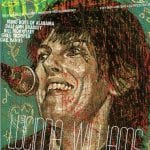Gail Davies – The reward is writing a great song
III. YOU CANNOT DO ART FOR COMPENSATION OR IT CEASES TO BE REAL ART
ND: Your new album was recorded at the Station Inn, and it seems like you might be finding a home in bluegrass.
GD: “Blue Heartache” was a real important record for a lot of bluegrass people. And then I wrote “Hometown Gossip” for the Whites [#27, 1985], and I wrote “Tell Me Why” for Jann Browne [#18, 1989], which was sort of a bluegrass record, and “Bucket To The South” [#14 for Ava Barber in 1978].
But I didn’t grow up on the Stanley Brothers, I grew up on Webb Pierce and Carl Smith, Faron Young. I didn’t even listen to Patsy Cline, I listened to Billie Holiday. My mother had everything from the Ink Spots to Tex Ritter.
ND: Are you still writing a lot?
GD: I don’t write very much anymore. I’m working on trying to get back. Lucinda gave me a big lecture the other night, she said, you need to not talk about bad things that happened to you, you need to put all this stuff behind you. And I do, I really do. She’s right, I agree. It’s hard because when somebody says, hey, why don’t you write a song about blah blah blah, I already wrote that song. I’ve written a lot of songs. What else do I have to say?
ND: Tell me about Little Chickadee.
GD: When I did the Eclectic album, I put it out on Little Chickadee productions, and DNA distributed it. I wrote all the songs, 100 percent of the songs, 100 percent of the publishing. So I didn’t have to pay anybody anything. I actually made money for the first time in my life. I have never seen a royalty check in my life.
ND: But it’s not all about money, is it?
GD: There’s a big difference between rewards and compensation. And I say this all the time: The reward is writing a great song. The compensation is the money that you get, or the applause you receive, or the praise. That’s the compensation. But you cannot do art for compensation or it ceases to be real art. You have to do art for rewards. And then you pray to god that there is enough compensation that you can continue to do art. That’s what it’s all about.
ND: Well, it can’t be easy.
GD: Years ago, Jimmy Bowen and some other people said to me, “Gail, you need to quit trying to be a singer, you’re too old.” I was 42. And I’m now going to be 53 in June. I thought that was hilarious, because it is such a sexist comment. Who would say, “B.B. King, you need to stop trying to be a guitar player, you’re too old?”
And I’m not trying to be a damn singer, I am a singer. It’s not something I’m tryin’ to do, I have been doing it since I was born. I was onstage when I was three years old.
I love going up to the IBMA and seeing Hazel Dickens. The bluegrass people don’t give a damn [about age], and the Europeans don’t give a damn, which is why I go and tour in Europe. I can’t get work in the United States of America. I can’t get work.
I sing better now than I’ve ever sung in my entire life. Opera singers aren’t even taken seriously until they’re 40, 45, when their voices develop. I’ve never sung better, I’ve never had more fun than I’m having now. And I can’t get work. Even living legends have to make a living, you know.




